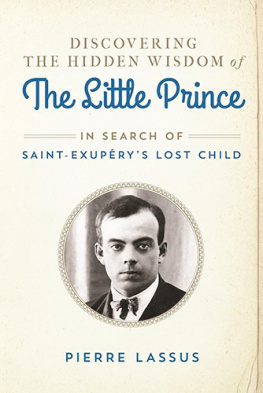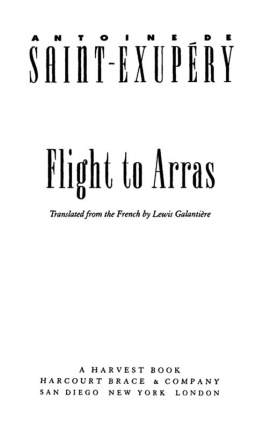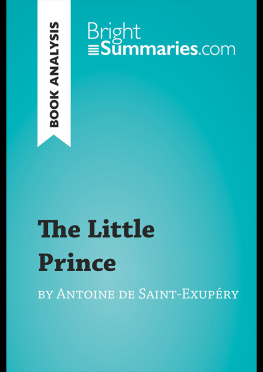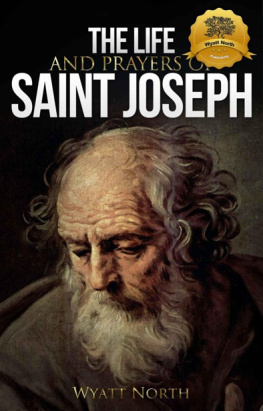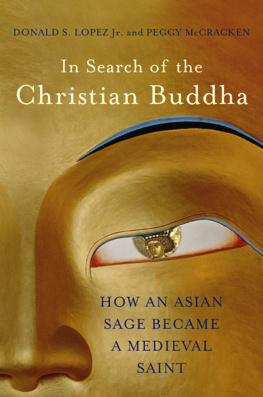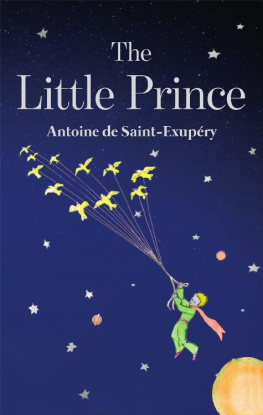Copyright 2014 by ditions Albin Michel
English-language translation copyright 2017 by Skyhorse Publishing, Inc.
All rights reserved. No part of this book may be reproduced in any manner without the express written consent of the publisher, except in the case of brief excerpts in critical reviews or articles. All inquiries should be addressed to Arcade Publishing, 307 West 36th Street, 11th Floor, New York, NY 10018.
First English-language Edition
Originally published in French by ditions Albin Michel under the title La sagesse du Petit Prince : la recherch de lenfant perdu avec Saint-Exupry
Scripture quotations are from Revised Standard Version of the Bible, copyright 1946, 1952, and 1971 National Council of the Churches of Christ in the United States of America. Used by permission. All rights reserved worldwide.
Arcade Publishing books may be purchased in bulk at special discounts for sales promotion, corporate gifts, fund-raising, or educational purposes. Special editions can also be created to specifications. For details, contact the Special Sales Department, Arcade Publishing, 307 West 36th Street, 11th Floor, New York, NY 10018 or .
Arcade Publishing is a registered trademark of Skyhorse Publishing, Inc., a Delaware corporation.
Visit our website at www.arcadepub.com.
10 9 8 7 6 5 4 3 2 1
Library of Congress Cataloging-in-Publication Data
Names: Lassus, Pierre, author. | Schmid, Gretchen, translator.
Title: Discovering the hidden wisdom of the Little prince : in search of Saint-Exuprys lost child / Pierre Lassus ; translated from the French by Gretchen Schmid.
Other titles: Sagesse du Petit prince. English
Description: First English-language edition. | New York : Arcade Publishing, 2017. | Includes bibliographical references.
Identifiers: LCCN 2017012325 (print) | LCCN 2017024094 (ebook) | ISBN 9781628726848 (ebook) | ISBN 9781628726817 (hardback)
Subjects: LCSH: Saint-Exupry, Antoine de, 19001944. | Authors, French20th centuryBiography. | Air pilotsFranceBiography. | Saint-Exupry, Antoine de, 19001944. Petit prince. | BISAC: LITERARY CRITICISM / Childrens Literature. | LITERARY CRITICISM / European / French. | BIOGRAPHY & AUTOBIOGRAPHY / Literary.
Classification: LCC PQ2637.A274 (ebook) | LCC PQ2637.A274 Z74913 2017 (print) | DDC 843/.912dc23
LC record available at https://lccn.loc.gov/2017012325
Cover design by Erin Seaward-Hiatt
Cover photo: Getty Images and iStock
Printed in the United States of America
In memory of my grandfather, Henri Durand,
a hero of World War I
and the pilots barber in Le Bourget from 1920 to 1950
Unless you turn and become like children, you will never enter the kingdom of heaven.
Matthew 18:3
He needed to build his own footbridge over the abyss and rejoin the other part of himself, across space and time.
Antoine de Saint-Exupry, The Wisdom of the Sands
CONTENTS
THE END OF THE BEGINNING
J ULY 31, 1944. B ORGO military airfield, south of Bastia, Corsica, 8:00 in the morning.
The Lockheed P-38 Lightning F-5B N223, part of the II/33 Aerial Reconnaissance Group, First Squadron, is waiting on the runway. It has been selected for a mapping mission to prepare for the Allied landing in Provence that will take place in several days. The assignment is to photograph the Annecy-Chambry-Grenoble region.
Lieutenant Duriez parks the jeep he has taken to collect the pilot from his quarters in Erbalunga, about fifteen kilometers away. He helps him put on his heavy, insulated flight suit and hoist himself into the cockpit. Perched on the wings of the aircraft, Sergeant Cotton and Airman Suty lend a hand as well, attaching the pilots parachute and strapping him into his seat, putting on his helmet and oxygen mask, connecting the radio, and checking the instruments before closing the canopy. On the ground, Chief Warrant Officer Roussel and Chief Sergeant Potier check the engines, the landing gear, the flaps, the rudders, and the fuel levels. They remove the wheel chocks. The pilot makes the usual hand signal to indicate that everything is okay. He starts the engines, and the airplane begins to jolt along the runway before lifting off the ground.
It is 8:45. In the blue, cloudless sky, the Lightnings engines leave double contrails as the aircraft rapidly disappears into the horizon, toward French soil.
Lieutenant Commander Antoine de Saint-Exupry has just taken off on his last mission.
G IVEN THE AMOUNT OF fuel on board, the flight can last between four and four and a half hours, so the aircraft should return around 12:15. At 13:00, the sky is still hopelessly empty, and anxiety levels on the ground are rising. Borgos air traffic control, contacted one hour after the expected arrival, isnt able to offer any information. Three Vickers Warwick airplanes sent to search the sector bring back no news. Radar indicates that the Lightning hasnt crossed the French coast to return to the airbase. At 14:30, as the maximum flight duration has long since been exceeded, it is impossible that the aircraft is still in the air. In the evening, after verification that he hasnt landed at another Allied airstripwhich has happened beforeLieutenant Commander de Saint-Exupry is pronounced missing in action.
As with the Little Prince, who left to be reunited with his star, they will never find his body.
T HE PILOT WHO HAS just disappeared was also a writer. He had published a number of works that brought him renown in France, England, Italy, and also the United States, where several of his books had been bestsellers. In 1939, Wind, Sand and Stars had received the National Book Award; that was the American title of Terre des hommes , which had received the Grand Prize for a Novel from the Acadmie Franaise that same year in France. In 1931, one of his earlier books, Vol de nuit ( Night Flight ), had been awarded the Prix Femina.
Antoine de Saint-Exupry had been living since 1941 in the United States, where he had been miserable not to be part of the fight to liberate France. In the hope of rejoining the II/33 Aerial Reconnaissance Squadron with which he had served during the campaign to defend France in 1940, he managed with some difficulty to secure a berth on the SS Stirling Castle , which sailed on April 13, 1943, for North Africa, where American troops had landed the year before, on November 8, 1942. In his luggage, he brought a single copy of his latest book, which his New York editor, Curtice Hitchcock, had published for him in English- and French-language editions just one week before his departure. It was The Little Prince.
On this sunny early morning of July 1944, when Saint-Exupryafter one last test of the enginesset off in his P-38 to conquer the French skies, he certainly could not have anticipated that his Little Prince , with over two hundred million copies sold in two hundred and seventy different translations, would bring him universal glory.
B Y THE TIME HE secured his final mission, Saint-Exupry may have sealed his own fate. Everything had seemed to oppose his taking command of the Lightning that day.
Already in 1939, after war was declared, he had had to fight hard and draw upon his fame and connections to be assigned to a combat unit, the II/33 Aerial Reconnaissance Group, based in Orconte in the Haute-Marne region of France. Most would have preferred that he work in the Information Services, directed by writer Jean Giraudoux, or at best as an instructor of aerial navigationbut certainly not as a fighter pilot. Moreover, at his medical checkup to be cleared to fly after he was called up in October, he was rejected for service: he had lived thirty-nine years, and his body bore the painful consequences of several of his previous accidents. But he couldnt stay on the sidelines, and he refused all the other postings that were proposed to him, despite everyones attemptsincluding his close friendsto convince him that he would be more useful alive than dead. For him, it was a question of honor: he didnt want to be taken for a coward, remaining in safety while his comrades were risking their lives. Such an attitude would have been unchivalrous, as he told Lon Werth.

